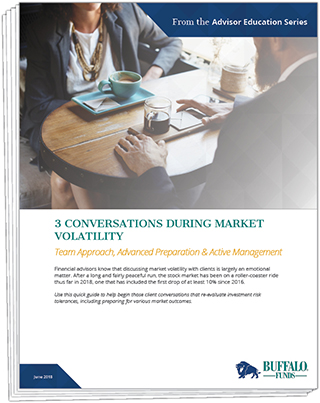An Important Note from the Buffalo Funds
Navigating Coronavirus Concerns
An Important Note from the Buffalo Funds
Excerpt from our 1Q 2020 newsletter:
The longest bull market in U.S. history came to an abrupt end in February, taking U.S stocks to their worst quarter in the past 12 years. Given the significant amount of uncertainty that has kept the market pundits worried over the course of this bull market — such as expensive valuations, Brexit, the Trump Presidency, healthcare reform, North Korea, Russia-gate, trade wars, and other various geopolitical unrest — it took a virus to bring the world economy to its knees. Such is the case in a typical “black swan” event, when an unpredicted event comes out of nowhere to wreck an economy. The swiftness of economic devastation, not to minimize lives lost to COVID-19, has been extensive and brutal. Unemployment is soaring in the U.S., going from record lows to double digits, as 16.8 million people filed for unemployment over the course of three weeks.
From a top-down perspective, given so little is known about the coronavirus other than that there is no vaccine or any consensus on best standard of treatment for patients most affected by the virus, the solution has been social distancing to prevent an overwhelming of the hospital infrastructure. This solution has caused an economic crisis, but hopefully it is buying some time to slow down the infection rate so that we can better understand this new enemy the world faces. While not meaning to come across as callous, this solution is only viable for a short time period. Having tens of millions of individuals without jobs and wondering how they will provide food for their families is not a mere inconvenience; their desire for survival will be brought to the forefront of their necessity. So, we would expect the economy to reopen sooner than later.
While the healthcare system is important to society, the consumer, through their spending, is a critical engine of the global economy, providing more than two-thirds of demand for all U.S. economic output. Small businesses account for approximately half of U.S. employment, according to the Small Business Administration. There will be a push to get the economy back to work, but it will take time to fully recover. There are likely to be changes to the economy that will take time to implement, if they are not already permanently displaced.
A category of the economy that will take time to return to “normal” is the oil and gas industry. In perhaps the most bizarre failure of strategy brinkmanship, the surprise Saudi–Russian oil price war announced in March during the cusp of a worldwide pandemic will go down in infamy. Though there was an output cut agreement in April, the damage has been felt. World crude prices plunged, and oil storage facilities are near full capacity, as “shelter-at-home” has destroyed demand for gasoline and oil. With the combination of weak demand and large surplus throughout the world, it will take years to normalize.
While ecommerce has been taking a share from the brick-and-mortar retail for years, the closing of “nonessential” business, which were primarily consumer discretionary retail stores, may have permanently solidified Amazon as the retailer of choice. Movie theaters are likely a thing of the past, even though they were already in secular decline. Sporting events will come back sooner than most anticipate, as most sport junkies like seeing history being made, rather than reliving it in reruns, and are desperate for fresh content. Video calls have become the new normal across all generations. Bandwidth demand will continue to increase, as a growing acceptance of remote working may become a reality. As companies seek to lower infrastructure costs, more regulations to keep employees safe in the workplace will be enacted. And the list goes on.
Though there are so many changes and uncertainties flowing through the market, these are truly exciting times to be an investor. The world central banks and governments are committing stimulus funds in amounts multiple times what was done during the financial crisis of 2008/2009 in order to help their economies recover. Of course, the recovery will have fits and starts and challenges as societies throughout the world return to normal.
At the Buffalo Funds, our core strategies are based upon identifying long-term trends that then provide the “hunting areas” for our funds to seek beneficiaries of those trends. We do this so our investments have a tailwind to their business strategy regardless of the economic conditions. For us, long-term trends are 10-20 years or more, as societies tend to be “glacier-like” in their behavioral changes. The changes adopted over the past several weeks, since “social distancing” has become the norm throughout the world, are likely a once-in-a-lifetime event. New “normal” social behaviors, that otherwise would have taken a generation to adopt, are being widely accepted overnight. It will take more time to determine if this is the “new normal” or not, but regardless, when one’s life or loved one’s life is in peril, inconveniences are more readily adopted. As we learn more about the COVID-19 virus and how to treat, prevent, and attack it, society will return to normal. Black swan events come and go, but human ingenuity prevails long-term.
We are in this together and will provide updates as they occur. Please feel free to continue to contact us over the phone or via email if you have any questions about your investments.
From everyone at the Buffalo Funds, our thoughts and prayers are with you.
Buffalo Funds Portfolio Management Team
CDC SITUATION SUMMARY
The Centers for Disease Control (CDC) has a web page dedicated to updating the public on the rapidly evolving situation regarding the coronavirus situation.
Click here to access their site.
ADVISOR CONTACTS
Christopher Crawford
Email ChristopherScott Johnson
Email Scott
Sign Up for Automatic Updates
Stay up-to-date with the most recent media coverage and press releases about the Buffalo Funds.



